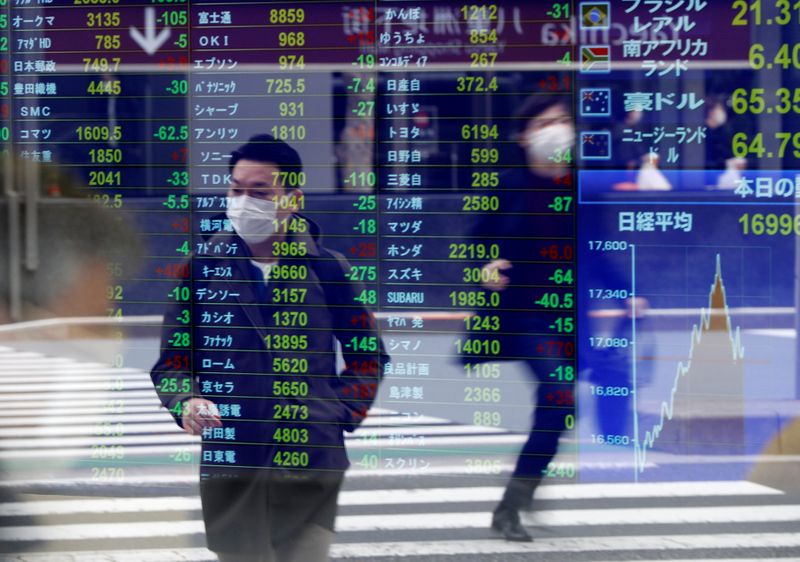By Marc Jones and Wayne Cole
LONDON/SYDNEY (Reuters) - Caution recaptured world markets on Monday as another drubbing for U.S. crude oil futures kicked off a week of data and earnings that will drive home the damage being inflicted by global coronavirus lockdowns.
European stocks made a choppy start, with the pan-regional EUROSTOXX 600 (STOXX) swinging in and out of positive territory in early trading. London's FTSE (FTSE) and Germany's DAX (GDAXI) were up 0.2%.
E-Mini futures for the S&P 500 (ESc1) slipped nearly 0.5% too, after Wall Street enjoyed a strong end to last week, though it barely seemed to reflect the latest violent turbulence in oil markets.
With some global storage facilities nearly full to capacity, the 'front-month' May benchmark U.S. crude contract (CLc1) was down $3.40, or 18%, to $14.87 a barrel, having at one point dived as low as $14.47 a barrel - the lowest since March 1999.
European benchmark Brent was down a more manageable 3% (LCOc1) at $27.30 a barrel, but it all points to the same problem - too much supply, not enough demand.
"For oil there is a bit of a technical story (with storage), but still, if energy consumption is down 30% and OPEC reduces supply by 10%, there is still a large gap," said Rabobank's head of macro strategy Elwin de Groot.
The equity and other major markets however were still trading largely on the newsflow of the European virus numbers gradually coming down, he added.
MSCI's broadest index of Asia-Pacific shares outside Japan (MIAPJ0000PUS) eased 0.2% in slow trade, pausing after five straight weeks of gains.
Japan's Nikkei (N225) fell 1.2%, but Chinese shares (SSEC) edged up 0.4% as a benchmark lending rate was lowered to shore up the coronavirus-hit economy after it contracted for the first time in decades.
U.S. President Donald Trump said on Sunday that Republicans were "close" to getting a deal with Democrats on a support package for small business.
The United States has by far the world's largest number of confirmed coronavirus cases, with more than 750,000 infections and over 40,500 deaths, according to a Reuters tally.
The S&P 500 (SPX) has still rallied 30% from its March low, thanks in part to the extreme easing steps taken by the Federal Reserve. The Fed has bought nearly $1.3 trillion of Treasuries alone, and many billions of non-sovereign debt it would historically have never gone near.
"The question is, are markets underestimating this in terms of the long-term impact on the economy. There will be damage and there will be damage in terms of the consumer psyche," Rabobank's de Groot said.
That damage should become all more clear this week with April global purchasing manager data - seen as some of the most forward-looking economic gauges - being published on Thursday.
A taster on Monday was that Japan reported its exports down almost 12% in March from a year earlier, with shipments to the United States down over 16%.
TESTING TIMES
In the currency markets, the dollar gained broadly as the concerns about global growth boosted the safe-haven appeal of the greenback and weighed on risk-oriented currencies such as the Australian dollar.
Against a basket of its rivals (=USD), the U.S. currency rose 0.2% to 99.90 and edged closer towards a three-year high of near 103 hit last month.
It gained about 0.1% on the euro and British pound and 0.2% on the Japanese yen. It last bought 107.80 yen
The dollar's gains were despite the latest trader positioning data showing investors have been ramping up their short positions or bets against the greenback.
Bond markets also suggested investors expected tough economic times ahead, with yields on U.S. 10-year Treasuries (US10YT=RR) steady at 0.63%, from 1.91% at the start of the year.
"We are dealing with scales of declining economic activity that nobody has seen before. The potential hit to GDP in the second quarter this year will probably far exceed what we saw at the worst point of the financial crisis," Capital Group's economist Robert Lind said in a note.
Italy's borrowing costs rose meanwhile, heading back towards last week's one-month highs, reflecting unease before a European Union summit later this week over how to tackle the economic fallout of the coronavirus crisis.
Selling pressure on Italian government bonds has returned in the past week, undoing some of the benefits of the European Central Bank's massive bond-buying scheme, after euro zone politicians failed to agree to common debt issuance as a means of addressing the crisis.
Italian Prime Minister Guiseppe Conte used an interview with Germany's Sueddeutsche Zeitung on Monday to repeat calls for the EU to issue common euro zone bonds to demonstrate the bloc's solidarity in the face of the pandemic.

"Thursday is the key day this week with the EU leaders summit a potentially big event for the future of Europe as they discuss how close the region can get to joint issuance in the near future," said Deutsche Bank (DE:DBKGn) strategist Jim Reid.
